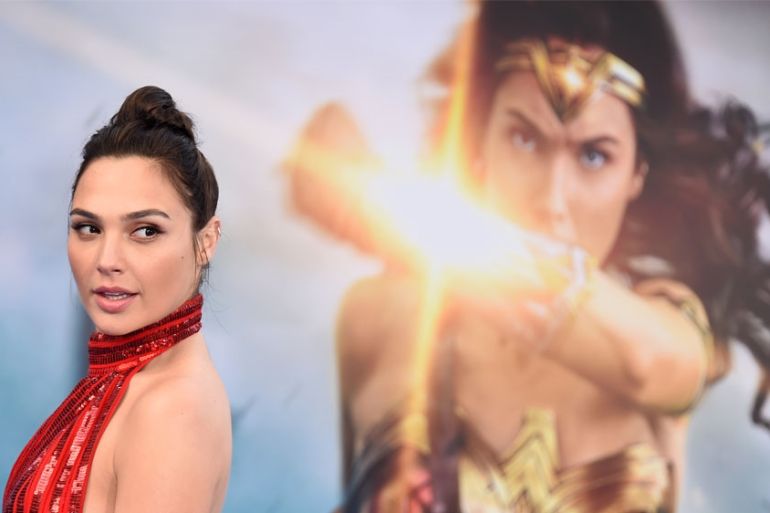Casting of Israeli actress Gal Gadot as Cleopatra sparks anger
Many accuse Hollywood of whitewashing and wonder whether Cleopatra should be played by an actress of colour.

Social media users have reacted with dismay at the casting of Israeli actress Gal Gadot in an upcoming film about Cleopatra, the queen of the Nile.
The movie, to be released by Paramount Pictures, will be directed by Patty Jenkins, who was also behind the 2017 film Wonder Woman and the upcoming Wonder Woman 1984.
Keep reading
list of 3 itemsThe wonder of imperial feminism
Tunisia joins countries boycotting Wonder Woman film
In both movies, Gadot plays the lead role.
Gadot is said to be behind the idea of the movie – billed as an epic biographical drama – written by Laeta Kalogridis.
As you might have heard I teamed up with @PattyJenks and @LKalogridis to bring the story of Cleopatra, Queen of Egypt, to the big screen in a way she’s never been seen before. To tell her story for the first time through women's eyes, both behind and in front of the camera. pic.twitter.com/k5eyTIfzjB
— Gal Gadot (@GalGadot) October 12, 2020
Fans’ reactions were mostly sceptical, with many accusing Hollywood of whitewashing and wondering whether Cleopatra should be played by an actress of colour.
Cleopatra was a descendant of Ptolemy I, a Macedonian Greek who established himself as king of Egypt after the death of his companion Alexander the Great.
White people keep casting white people to play Cleopatra and Ancient Egyptians, but cry when someone cast a black person in a fantasy tv show or movie, make it make it sense. Also nice to see we still can’t count on white women to cast women of color. https://t.co/F1ic4gCuaf
— The Afro Nerd (@theafronerd) October 11, 2020
Yeah, Cleopatra was Greek. I get it. But casting a zionist whose family is Polish/Austrian/Czech as the queen of Egypt in 2020? Why not just rewatch the Liz Taylor version?
— Randa Jarrar (@randajarrar) October 11, 2020
Lexi Alexander, a Palestinian-German director, said the role should go to a Black actress.
“I believe we should cast someone like the 3D image they created based on the the coin they found with Cleopatra on it … which means the part should go to a Black actress,” she said on Twitter.
I don’t know if I missed another announcement or if this is still about Cleopatra…but we already went through this, at great length, when Angelina Jolie and Lady Gaga competed for the role…remember, this is the last 3D image Smithsonian Egyptologists created of Cleopatra pic.twitter.com/AV177I3j8p
— Lexi Alexander (@Lexialex) October 12, 2020
Others pointed to Gadot’s history of having served in the Israeli army, and her outspoken support for the army’s military offensives on the besieged Gaza Strip.
I'm not sure if I'm more offended because she's a colonizer-warmonger or just a terrible actor.
— Jennifer Jajeh (@jenjajeh) October 12, 2020
Gadot was an active soldier in the military when Israel invaded and bombed southern Lebanon in 2006.
In 2014, during Israel’s 52-day war on the Gaza Strip in which more than 3,000 Palestinians were killed – the majority of them civilians – she expressed her support to the Israeli army.
“I am sending my love and prayers to my fellow Israeli citizens,” Gadot wrote in a Facebook post.
“Especially to all the boys and girls who are risking their lives protecting my country against the horrific acts conducted by Hamas, who are hiding like cowards behind women and children … We shall overcome!!! Shabbat Shalom!”
Gal Gadot’s grandparents are from Germany, Poland, and Austria – none of those are Mediterranean.
Even the surname was changed – it used to be Greenstein. pic.twitter.com/q3sWGEytgR
— s(tream the rarities) mindset (@shahnahan) October 12, 2020
Whatever you think of her being cast as Cleopatra, never forget that Gal Gadot proudly served (and continues to support) a colonial army notorious for maiming and murdering civilians.
— Steven Salaita (@stevesalaita) October 11, 2020
Gadot is not the first white woman to play Cleopatra.
Claudette Colbert, Vivien Leigh and Elizabeth Taylor have all portrayed the historical figure in the past.
In 2017, Lebanon, Tunisia and Qatar banned Wonder Woman.
Lebanon’s decision was based on the grounds of a long-standing boycott of Israel, and Tunisia complied with the boycott after one of its parties slammed normalisation with Israel.